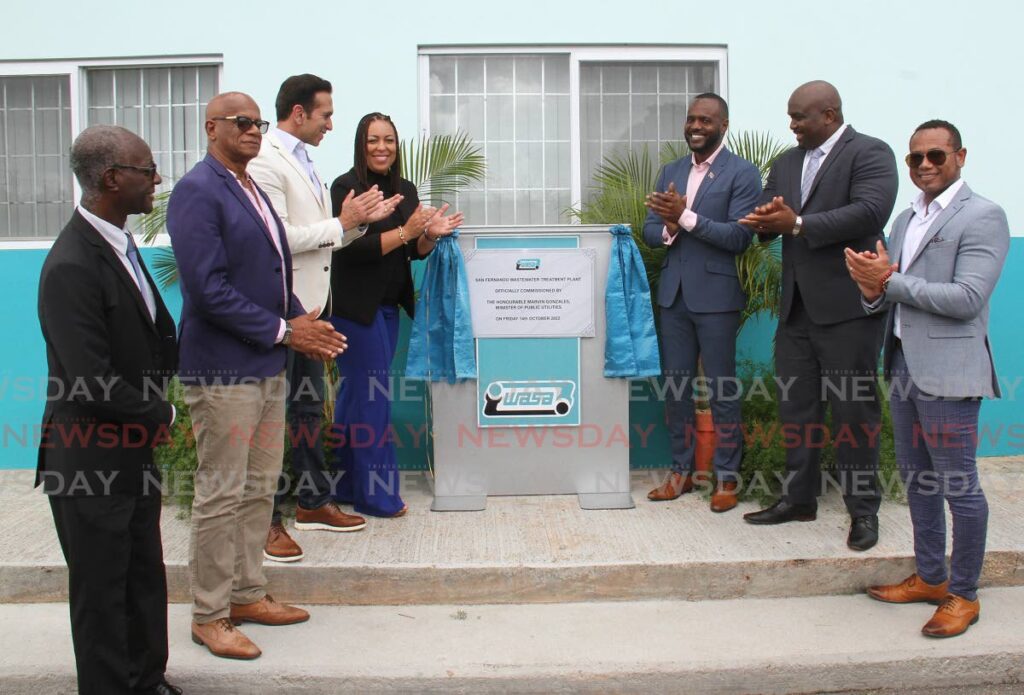Gonzales proposes expanded wastewater coverage

SOME 17 years after the project was first conceptualised, San Fernando has finally received the promised WASA wastewater treatment plant. The plant has a capacity to treat 45 million litres per day and serve a population of approximately 116,000 people in surrounding communities of San Fernando East and West, Pointe-a-Pierre and Oropouche East.
“The San Fernando wastewater treatment plant is the culmination of years of planning and construction, and a capital investment of just over $120 million,” Public Utilities Minister Marvin Gonzales said, as he formally commissioned the facility at Gulf View, La Romaine on Friday.
The project was funded by the InterAmerican Development Bank (IDB), with main contractor Acciona Agua SA in association with Atlatec, SA De CV and AAA Wastewater Treatment Plant Ltd (AAA). Consulting firm AECOM Canada Ltd supervised and designed the facility and its collection system.
Gonzales said along with the projects at Malabar and Trincity, the San Fernando plant now places TT as having the largest wastewater coverage in the entire Caribbean, which stands at 42 per cent.
“We have heard about the importance of wastewater in so far as it relates to human health and reduction of water-borne diseases affecting so many of our children and populations around the world.”
In the circumstance, he said, “I propose to go further to continue the drive to expand wastewater coverage in TT.”
With the coming onstream of this facility, he said, “the raw sewage overflows which occurred ever so often due to non-functioning privately-owned pumping stations in this catchment area, will now be a thing of the past resulting in a reduction in the risks to public health and the environment
Stating that the treatment plants present a number of opportunities for TT to explore, Gonzales said instead of throwing wastewater out into the environment, he intends to engage the IDB in a discussion where highly treated wastewater could be used by the agricultural, commercial and industrial sectors.
In this way, he said, potable water now used for these purposes can be channelled to homes to provide a 24/7 service.
“When you look at a modern facility like this one in San Fernando, you would not be able to distinguish wastewater and water from the bottle that we are drinking from.”
In keeping with the proposals to transform the water and sewage system, Gonzales said approval was given, two weeks ago, for another loan facility of US$315 million from the IDB.
There are three components to this facility – water stabilisation and improvement, support for water-sector transformation, and network optimisation.
“That first operation will be made available to us by the end of the year and it will be put to use to support major infrastructure works around the country and will increase water supply.”
Gonzales said they have been hard at work over the last few years, putting together plans not only for the transformation of WASA, but designing some specific key project all across TT which will not only turn around WASA from an institutional management perspective.
He said it would initiate a number of projects to increase water production, automate all WASA infrastructure and improve water supply to the people of TT.
He said WASA is undertaking a series of repair and rehabilitation works at several water treatment plants, to bring them up to capacity, as too often they were not aware of the amount of water being produced in some of plants or when wells go down.
Tired of hearing complaints on social media about water disruptions, he said there is a proposal to automate WASA’s water production, transmission and distribution.
“So we can understand, in real time, and know when disruptions occur so that we can reduce the negative impact on our customers.”

Comments
"Gonzales proposes expanded wastewater coverage"